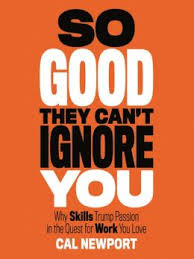
Career Capital in the Fitness Industry – Part 1
I’m a big fan of Cal Newport’s fantastic book, So Good They Can’t Ignore You.
Newport goes to great lengths to demonstrate just how terrible “follow your passion” is as career advice. It’s a compelling read, especially for those who are working hard to develop a career they genuinely enjoy.
Newport argues against the “passion” approach, as it can lead individuals down a road that may not be financially viable; just because you enjoy something doesn’t mean that you’ll be able to make a living doing it. This may be because there isn’t sufficient demand in the market for it, or because you might not have sufficient “career capital” to be successful enough early on to actually stay in business. “Career capital,” according to Newport, consists of “rare and valuable skills;” you need these to acquire the “traits that define great work.” And, as the author also points out, being very good at what you do is actually more closely linked to job satisfaction than income alone.
Newport continues with several case studies to support this “Career Capital Theory:” people work long and hard to acquire rare and valuable skills (don’t forget Malcom Gladwell’s 10,000-Hour Theory) that give them more and more control over their careers by making them coveted and/or indispensable in their field of study. This control doesn’t just afford them more compensation and flexible schedules, but also enables them to gradually test the waters to determine whether one specific avenue or “niche” is best for long-term career satisfaction.
This is a stark contrast to the fitness industry, where many folks have lost their life savings opening gyms because they enjoyed exercise – but didn’t have the rare and valuable skills required to be successful in the fitness industry. It leads to the question: why are some people very successful in the fitness industry – even with mid-life career change – while others fail miserably? What are the “rare and valuable skills” that allow them to succeed?
Before I answer these questions, though, I thought I might shine a little light on how Newport’s theories spoke directly to me. To be candid, growing up, I never expected to work in the fitness industry. In fact, it was quite the opposite: I went to college thinking I was going to be an accountant.
However, around that time, I had some health problems, and as I got healthy, had to learn a lot about proper training, nutrition, and recovery so that I could put weight back on and get my strength back. I realized that it was something I enjoyed, and learning in this realm came somewhat naturally to me. After much deliberation, I decided to transfer to a new school to pursue exercise science – but I still “hedged my bet” by doing a double major in sports management and exercise science. I had two years of business school under my belt, and wanted to continue to nuture my entrepreneurial spirit (and avoid losing a lot of college credit).
Over the next two years, I worked for $7/hour at a gym to learn everything I could about the industry – all while I was taking classes. Simultaneously, I was rehabbing my shoulder from a chronic tennis-related condition, so I was “accidentally” finding a niche within a niche. Without even knowing it, I was building career capital while testing the waters to make sure it was actually what I wanted to do. I might not have gotten 10,000 hours under my belt by the age of 22, but I was definitely well on my way – and it put me in a position to know that I wanted to go to graduate school for exercise science.
At graduate school, I had the opportunity to “feel out” what I wanted to do without much risk. I got involved in the human performance laboratory to see if research was for me (it wasn’t). It was only when I volunteered in varsity strength and conditioning that I found something I genuinely enjoyed, and I recognized that I could do well and be very happy working in collegiate strength and conditioning. Interestingly, I spent most of my time working with soccer and basketball players while I was there.
As it turns out, I tested the waters in the private sector when I first left graduate school, and enjoyed working in that realm. Over the subsequent few years, I trained as many people – athletes and non-athletes alike – as I could possibly fit into my schedule. I honed my skill set, learned about what I enjoyed the most, gradually created more and more autonomy in my schedule, became financially stable, and recognized a sustainable, underserved population (baseball players) where I had unique expertise. Without even recognizing it, I had built career capital and started to “purchase” the coaching life I wanted.
That was 2007, when we founded Cressey Sports Performance. I’ve had seven more years to acquire career capital in a number of different contexts – actual training knowledge, interactions with athletes, managing employees, cultivating business relationships, evaluating opportunities, and a host of other areas – to put us the position we’re in (opening a second location in Jupiter, FL).

Back in 1999, I had no idea training baseball players would be my ideal job. And even if I had known, I probably would have fallen flat on my face if I’d tried to follow this passion. I didn’t have enough rare and valuable skills to be successful at that point.
Fast-forward five years to 2004, and my current business partner and I watched the Red Sox win the 2004 World Series together. It was an awesome moment for us as baseball fans.
Another five years later, we owned a business and were training two of the athletes that were on the 25-man Red Sox roster that won that World Series. It was an awesome moment for us as business owners who’d earned and redeemed career capital.
“Follow your passion” IS horrible career advice; “build career capital” isn’t. In Part 2, I’ll discuss what “rare and valuable skills” one needs to be successful in the fitness industry. In the meantime, I’d strongly encourage you to check out Newport’s book, So Good They Can’t Ignore You.





